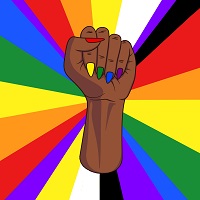Personal experience is an important source of inspiration among independent game makers. The testimoniality of such games, when it comes to show personal experiences, has been a way to “take back an art form,” according to A. Anthopy (2012). However, this seems to not be quite the fact in the intersection between blackness and queerness, in amateur (and professional) video games. This paper is an exploration of the existence of black, queer characters, mainly in romance, dating and pornographic games, which require an exposition of body, whether it is made of images or of written elements, and of personal identity, through critical discourse analysis (Fairclough, 1992) and game studies, with a focus on game representation (Malkowski & Russworm, 2017) of queer characters. The intersectionality of race, gender, sexuality is the main focal point, and quare (Johnson, 2001) explorations of mainstream media is an important question nowadays (Crémieux, 2019), as movements towards self-expression are rising.
Is there an auto-ethnographic movement in video games? Are quare identities already implemented in videogames? Is the representation of quare people drawn from other contemporary media, such as the representations of new black queerness, as Bob the Drag Queen has expressed, on stages, in Rupaul's Drag Race, and on TikTok?
First, the analysis of personal representations in games will be tackled, using Cobra Club (R. Yang, 2016) as a starting point. This game, described as a “dick pic studio” is actually about data management and the government. In the guises of a fake gay dating website, it allows players to embody someone who has a penis (real or prosthetic), and trade selfies with computer-generated partners. In the later stages of the game, the player's pictures are uploaded on the Twitter account of the game (@cobraclubpics[1]) without their knowledge. How do players portray themselves? Does the “intimacy” or the humoristic (Yang, 2018) creations of penises—and characters they are attached to—lead to the creation of hegemonic black characters? Some sport small, flaccid penises, while others have colored prosthetic appendages. This preliminary reification of Black representation will lead to the study of games aiming at representing black characters in queer settings, and an initial rebuttal of hyper-virility (Phillips, 2017).
Dating games (based on the Japanese bishoujo/otome genre) are often the grounds for the expression of bodies and stereotypical representations, sometimes seen as an ideological expression of consumerism, of male gaze, but there are more and more spaces for creative endeavors (Sellier, 2021:8-14). “A game conveys what's like to experience the subject as a system of rules” (Anthropy, 2012:3), and Yearning: a gay story (2019) may be a good starting point to explore identity and relationships with a special interest on the depiction of Black people. It will be compared to the gay dating game Dream Daddy (2017), one of only a few examples of positive, non-pigeonholing examples of gay, Black characters...or is it?
This paper aims at evaluating the recent developments in quare identities in videogames, through discourse analysis.
Corpus (selection)
bobcgames (2019). Yearning: a gay story. Itch.io, Google Store.
Game Grumps (2017). Dream Daddy. Game Grumps.
Staple, Ch. (2017) The Outer Worlds, Obsidian.
Yang, Robert (2016). Cobra Club. Itch.io.
References
Anthropy, A. (2012). Rise of the videogame zinesters: How freaks, normals, amateurs, artists, dreamers, dropouts, queers, housewives, and people like you are taking back an art form. New York: Seven Stories Press.
Crémieux, A. (2019). “From Queer to Quare: The Representation of LGBT Blacks in Cinema”. In Reid, Mark A. African American Cinema Through Black Lives Consciousness, Wayne State University Press.
Malkowski, J., & In Russworm, T. A. M. (2017). Gaming representation: Race, gender, and sexuality in video games. Bloomington, Indiana: Indiana University Press.
Patrick Johnson, E. (2001) “"Quare" studies, or (almost) everything I know about queer studies I learned from my grandmother”, Text and Performance Quarterly, 21:1, 1-25,
Phillips, Amanda (2017), “Dicks Dicks Dicks: Hardness and Flaccidity in (Virtual) Masculinity.” Flow.
Sellier, H. (2021). "Les otome games entre formatage idéologique et formation identitaire : une recherche-création en entreprise." Interfaces, https://journals.openedition.org/interfaces/3849
Yang, R. (2018) “Cobra Club as Ouroboros”, Radiator, https://www.blog.radiator.debacle.us/2015/05/cobra-club-as-ouroboros.html (last access: 04/12/2022)
[1] Available at the address: https://twitter.com/cobraclubpics (last access: 04/13/2022).

 PDF version
PDF version
